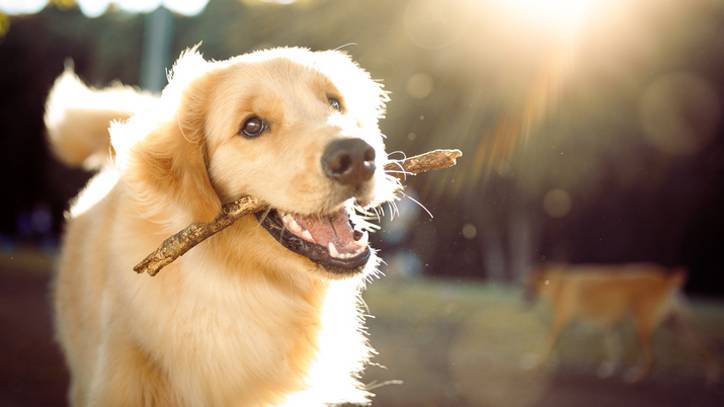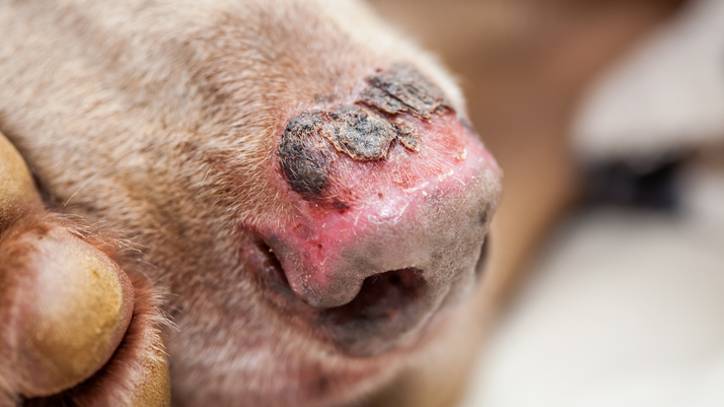Can dogs get sunburn, and is there sunscreen for dogs?
Can dogs get sunburn? Find out if you can use human sunscreen on your dog.

Get the best advice, tips and top tech for your beloved Pets
You are now subscribed
Your newsletter sign-up was successful
As temperatures rise in the summer months and you enjoy more time outside with your four-legged friend, you may wonder if your dog can get sunburned and whether sunscreens are suitable for protecting pets in hot weather.
The answer to both is yes. Dogs are vulnerable to sunburn in soaring temperatures, particularly if they have a light-colored or short-haired coat. If you have a dog who loves to spend time in the great outdoors (and most of them do), you’ll need to be particularly careful in protecting your pooch from sunburn and dog heatstroke.
We’ve got everything you need for pup sun protection, from keeping your dog cool in hot weather to spotting the signs and symptoms of sunburn and heatstroke, alongside how to treat both safely and quickly. Plus, we have tips on finding pet-safe sunscreens that you can use with your furry friends when you’re out and enjoying the weather.
Can dogs get sunburn?
It’s not just humans that get sunburn; our furry friends can get it too. So, which dogs are most affected by sunburn? And should I let my dog sunbathe?
Well, any dog can get sunburn, but those with thin or white fur are most at risk. Of course, dogs are protected by their very own fur coat, which you’d think would protect them from the sun’s rays.
But can dogs get sunburn under their fur? Although your canine companion's fur offers some protection, they can still burn in areas with sparse or no hair, like their bellies and noses.
How to check for sunburn in dogs
Knowing what to look for is part of keeping your dog safe in the sun. So, what are the signs and symptoms of sunburn in dogs?
Get the best advice, tips and top tech for your beloved Pets
Firstly, if you're concerned that your dog might have sunburn, it's best to check the areas where they have the least fur.
In most dogs, this is their nose, muzzle, and tummy, but depending on your dog, it might also include the inner thighs or ears.
If your dog has sunburn, the skin may look red and feel hot to the touch. In extreme cases, you might notice blistering or scabs too.

How to treat sunburn in dogs
If you think your dog might have sunburn, you should take them to the vet immediately. Your vet can prescribe medication to reduce the soreness and inflammation.
If there are scabs or blisters, they may also prescribe antibiotics in case of infection. But, aside from vet treatment, is there anything you can do at home? Can aloe vera alleviate the symptoms of sunburns in dogs?
Applying aloe vera to your dog's skin may help to soothe it and is unlikely to cause harm. However, you should always check with your vet before using home remedies.
Do dogs need sunscreen?
As the saying goes, 'prevention is better than cure'. So, how do you protect a dog from getting sunburn? Do dogs need sunscreen?
The answer is yes; if you can't keep your dog out of the sun, using a pet-safe sunscreen on your dog during sunny weather is a good idea. This won't just prevent sunburn; it will also protect them from certain types of skin cancer.
How to apply sunscreen for dogs
When applying sunscreen to your dog, you should ensure it's safe for dogs. First, you should try applying a small amount to make sure they don't react to it. You can use it safely if there are no side effects after 24 hours.
Apply it to the areas where your dog is bald or has thin fur, paying particular attention to their nose and muzzle. However, don't apply it too liberally; you don't want your dog to lick it off as, although it's safe, it won't work! Avoid getting it into their eyes if you can, and speak to a veterinarian if your dog’s skin or eyes seem sore or irritated.
What kind of sunscreen is best for dogs?
We should all use sunblock to protect our skin from sun damage, so you might have already stocked up for the summer.
But, can you put human or baby sunscreen on dogs? The answer is no. It's essential to use sunscreen that is specifically formulated for dogs.
Human sunblock often contains toxic ingredients like zinc oxide and para-aminobenzoic acid (PABA), which could make your dog unwell if they ingest it. So, if you've just applied human sunscreen to your dog before realising the risks, wash it off immediately and speak to your veterinarian for advice.
The only sunscreen alternative to keep your doggo safe is preventing sun exposure by keeping them inside or in shady areas.

Other risks of hot weather for dogs
Sunburn and skin cancer aren’t the only worries about keeping your dog safe in sunny weather.
Heatstroke is another concern, and it can be severe. Heatstroke occurs when your dog’s body temperature goes so high that their natural cooling methods (panting) fail, and their temperature continues to rise.
Signs of overheating in dogs are excessive panting, bright red or blue-ish gums, a dry mouth or excessive drooling, lethargy, disorientation, and even seizures.
If you think your dog might have heat stroke, you should get them wet (if you can), put them in an air-conditioned car, and take them straight to the vet. You can call your vet on the way to let them know you are coming.
For further information on how to cool your dog down see our vet's guide.
How long should you let your dog lay in the sun?
Dogs shouldn’t be walked or exercised on hot days. However, some dogs enjoy lying in the sun. As long as they have free access to shade and water, they should regulate their behavior, so they don't overheat.
However, if your dog is panting excessively after laying out in the heat of the day, you should take them to the shade and encourage them to drink. Other measures you can take to ensure your dog doesn’t get too hot is to provide ice cubes or other frozen dog treats and encourage water play with the best pool for dogs.
Dogs love the summer just as much as we do. After all, school holidays and drier weather mean more quality time with the family.
As long as you adjust walk times and provide shade, water, and doggy sunscreen, your furry family member can enjoy their summertime adventure with you.
Dr Hannah Godfrey is a small animal vet who graduated from the Royal Veterinary College in 2011 and began work straight away at a busy mixed practice. Initially, she treated all species, but focussed on small animals from 2014. She has a passion for soft tissue surgery, ultrasound, and canine and feline dentistry, having completed additional training in these areas.

